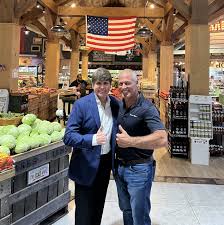In an era dominated by corporate agribusinesses and global food supply chains, Alfie Oakes is on a mission to bring fresh, local produce directly to consumers, challenging the conventional food system and reshaping the way we think about food sourcing. As the founder of Oakes Farms and Oakes Farms Market, Oakes has made it his life’s work to promote healthy, sustainable food while ensuring that local farmers and communities benefit from a direct connection to the food they eat. His efforts are not just about selling vegetables and fruits—they’re about creating a movement that supports sustainability, local economies, and food sovereignty.
At the heart of Oakes’ vision is a simple yet powerful idea: to provide fresh, locally grown produce to as many people as possible, while fostering a system that benefits both consumers and the environment. It’s a bold mission, one that challenges the industrial food system and the idea that mass production and long supply chains are the only way to feed the masses. But Oakes, with his farm-to-market approach, is proving that with the right model, local agriculture can thrive on a larger scale.
Building Oakes Farms: A Foundation for Fresh, Local Produce
Oakes Farms, located in Naples, Florida, started as a small family-owned farm and has grown into a major agricultural operation that supplies a wide variety of produce to local markets, restaurants, and consumers. What started with a handful of crops and a lot of ambition has expanded into a diversified farm that grows everything from tomatoes and cucumbers to squash, peppers, and lettuce.
What sets Oakes Farms apart from many other agricultural operations is the emphasis on fresh, local, and organic produce. While industrial farms often rely on mass production techniques and long supply chains that transport food over thousands of miles, Oakes has focused on providing fresh produce grown on his land. The farm’s commitment to sustainability ensures that the produce isn’t just fresh, but also grown using methods that prioritize environmental health and soil quality. By practicing organic farming methods and regenerative agriculture, Oakes aims to create a model where farming works in harmony with nature, rather than exploiting it.
One of Oakes’ key goals has been to make fresh produce available not only to high-end restaurants or specialty markets but to the broader public. By scaling up his operations and focusing on both quality and efficiency, Oakes has proven that locally grown produce doesn’t have to come with a premium price tag. This has been central to his mission: to make fresh, locally grown food accessible to as many people as possible, without the need to rely on corporate supermarket chains.
Oakes Farms Market: A Direct Connection to Consumers
The opening of Oakes Farms Market was a natural extension of Oakes’ commitment to bringing fresh, local produce to the masses. Located in Naples, the market serves as both a retail store and an educational space that connects consumers directly with the farmers who grow their food. The market offers a wide range of products, including fresh vegetables, meats, dairy, and pantry staples—all sourced from Oakes Farms or local suppliers who share his values of sustainability and food integrity.
What makes Oakes Farms Market stand out is its focus on transparency. Customers can not only purchase fresh produce, but they also learn about how and where it was grown, the farming practices used, and the benefits of buying locally. This educational approach helps to build trust with consumers and encourages them to make more informed decisions about the food they buy.
In addition to providing fresh produce, Oakes Farms Market also offers a unique shopping experience. The store is designed to showcase the values of the farm, with clear signage that explains the origins of the products and the benefits of sustainable agriculture. The store’s layout and design reflect Oakes’ commitment to creating a community-oriented space where people feel connected to the food they eat.
One of the key benefits of the market model is that it allows Oakes to sell produce directly to consumers, cutting out the middleman and ensuring that farmers get a fair price for their goods. This direct-to-consumer model also benefits shoppers, who are able to access high-quality food at more affordable prices than they might find in traditional grocery stores. The success of Oakes Farms Market has proven that there is a growing demand for local food systems and that consumers are willing to support businesses that prioritize sustainability and community over corporate profits.
Promoting Sustainability and Regenerative Agriculture
At the core of Oakes’ mission is a deep commitment to sustainable and regenerative farming practices. While many large-scale farms rely on monoculture crops, pesticides, and synthetic fertilizers, Oakes Farms follows a more holistic approach to agriculture. Regenerative farming is a set of practices that aims to improve soil health, increase biodiversity, and reduce the environmental impact of farming. Techniques such as crop rotation, cover cropping, and composting help to maintain and even restore the health of the soil, which is crucial for producing nutrient-dense, high-quality food.
Oakes is an advocate for the idea that farming should not only sustain human life, but also nurture the land for future generations. By using these methods, Oakes is working to create a more resilient and sustainable food system that can withstand the challenges posed by climate change, soil degradation, and environmental stress. His focus on soil health and ecosystem restoration is central to the long-term success of Oakes Farms, and it’s a practice he’s passionate about sharing with other farmers.
In addition to regenerative agriculture, Oakes is a vocal advocate for reducing food waste. At his market, he sells “imperfect” produce—fruits and vegetables that may not meet the cosmetic standards of large grocery chains but are still perfectly edible. By reducing food waste, Oakes not only helps to reduce the environmental footprint of his farm but also makes fresh produce more accessible to people who may otherwise be priced out of the market.
A Vision for a More Connected Food System
Alfie Oakes’ mission to bring fresh, local produce to the masses is part of a larger vision to create a food system that is more connected, sustainable, and resilient. He believes that the future of food lies in local agriculture—not just for the wealthy few, but for everyone. By making fresh, healthy food available at affordable prices, Oakes is challenging the current food system, which has become dominated by global supply chains and corporate giants.
Oakes’ approach is a response to the growing concerns over food security, the environmental impact of industrial agriculture, and the lack of transparency in our food supply. His mission is to empower consumers to make choices that support sustainable farming practices and local communities. By supporting local farms and choosing food that is grown sustainably, consumers can help build a food system that works for everyone—farmers, consumers, and the planet.
The Future of Local Food
Alfie Oakes has proven that local food systems don’t have to be small-scale or niche—they can be widespread and impactful. His success in bringing fresh, local produce to the masses demonstrates that there is a significant demand for food that is grown with care and respect for the environment. Oakes’ work is not just about selling produce—it’s about creating a model for a more sustainable, community-driven food system that can serve as an example for others to follow.
As more people become aware of the environmental and health benefits of supporting local farmers, Oakes’ mission is likely to resonate with a broader audience. By continuing to innovate and lead with transparency and sustainability, Alfie Oakes is helping to reshape the way we think about food—and inspiring others to take action toward a more sustainable and equitable future for all.



